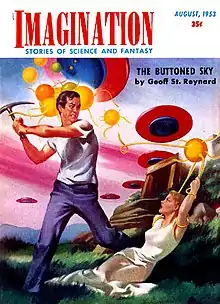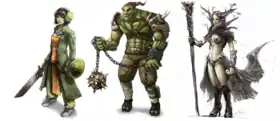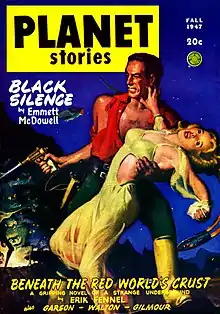Planetary romance
Planetary romance is a subgenre of science fiction or science fantasy in which the bulk of the action consists of adventures on one or more exotic alien planets, characterized by distinctive physical and cultural backgrounds. Some planetary romances take place against the background of a future culture where travel between worlds by spaceship is commonplace; others, particularly the earliest examples of the genre, do not, and invoke flying carpets, astral projection, or other methods of getting between planets. In either case, it is the planetside adventures which are the focus of the story, not the mode of travel.[1]

| Fantasy |
|---|
 |
| Media |
|
| Genre studies |
| Subgenres |
|
| Fandom |
| Categories |
|
|
The Encyclopedia of Science Fiction mentions two caveats as to the usage of the term. First, while the setting may be in an alien world, its nature is of little relevance to the plot, as is the case of James Blish's A Case of Conscience. Second, hard science fiction tales are excluded from this category, where an alien planet, while being a critical component of the plot, is just a background for a primarily scientific endeavor, such as Hal Clement' s Mission of Gravity, [2] possibly with embellishments.
A significant precursor of the genre is Edwin L. Arnold's Lieut. Gullivar Jones: His Vacation (1905).[2]
In Science Fiction: The 100 Best Novels (1985), editor and critic David Pringle named Marion Zimmer Bradley and Anne McCaffrey two "leading practitioners nowadays" for the planetary romance type of science fiction.[3]
There is a significant overlap of the genre with that of sword and planet.
Examples

In fiction
- Almuric by Robert E. Howard
- Arrakis (in the Dune series) by Frank Herbert
- Barsoom (Mars) and Amtor (Venus) by Edgar Rice Burroughs
- Callisto by Lin Carter
- Darkover by Marion Zimmer Bradley
- Eldorado by Francis Carsac
- Several works by Alan Dean Foster: Midworld , Sentenced to Prism , Voyage to the City of the Dead , Drowning World , and most of the Flinx and Pip stories
- Gor by John Norman
- Hainish Cycle by Ursula K. Le Guin
- Helliconia by Brian Aldiss
- Jack of Shadows by Roger Zelazny
- Kregen by Kenneth Bulmer
- Krishna by L. Sprague de Camp
- Majipoor by Robert Silverberg
- Pern by Anne McCaffrey
- The Radio Man by Ralph Milne Farley
- Riverworld, The Green Odyssey and World of Tiers by Philip José Farmer
- The Saga of the Skolian Empire by Catherine Asaro, including the worlds of Raylicon, Balimul, Parthonia, Debra, and Skyfall.
- The Space Trilogy by C. S. Lewis.
- Michael Kane of Old Mars by Michael Moorcock
- Tormance in A Voyage to Arcturus by David Lindsay
- Much of the science fiction work of Jack Vance: the Big Planet duo, the Alastor trio, the Durdane trilogy, the Cadwal Chronicles trilogy, the Tschai or Planet of Adventure tetralogy, most of the Magnus Ridolph stories, the Demon Princes pentalogy, and various stand-alone novels such as Maske: Thaery and short stories such as The Moon Moth.
In comics
- Adam Strange
- Buck Rogers
- Flash Gordon
- Space Family Robinson
- World of Two Moons/Abode—Elfquest
- Den
- The Trigan Empire
- Apokolips and New Genesis—Fourth World
- The Joker System—Five Star Stories
- Planet Hulk
- World War Hulk
- Ythaq: The Forsaken World (French: Les Naufragés d'Ythaq)
In film and television
- Aquaman - film adaptation of Aquaman franchise primarily set in the fantastical and technologically advanced five kingdoms of Atlantis at the bottom of the sea
- Avatar – James Cameron film set exclusively on the fictional world of Pandora.
- Defiance – TV series set exclusively on a terraformed, altered version of Earth itself.
- Earth 2 – TV series set exclusively on an Earth-like planet known as 'G889'.
- Forbidden Planet — an early film in the genre (1956), set entirely on the planet Altair IV.
- Irandaam Ulagam – Indian Tamil language film
- John Carter – A film depicting a romanticized version of Mars (Barsoom).
- Thor: Ragnarok - A film based on Planet Hulk, primarily set on the planets of Asgard and Sakaar
Miscellaneous
- Byston Well— Aura Battler Dunbine
- Eternia and Etheria— Masters of the Universe
- Sagar— Blackstar
- Third Earth— Thundercats
References
- See Science Fiction Citations: Planetary Romance Archived 2008-01-08 at the Wayback Machine; and John Clute, "Planetary Romance", in Encyclopedia of Science Fiction, ed. John Clute and Peter Nicholls, 1995, ISBN 0-312-13486-X.
- Planetary Romance
- David Pringle, Science Fiction: The 100 Best Novels, An English-language selection, 1949–1984, London: Xanadu Publ, 1985. Page 17. Pringle does not include any Bradley or McCaffrey novels. Introducing his selections, he says, "I admit to blind spots—for example, I have little affection for the type of sf story which has been called 'planetary romance'".